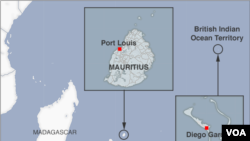The Supreme Court in the East African island nation of Mauritius has struck down a colonial-era law outlawing same-sex relations, a rare move at time when nations on the continent have passed strict anti-gay or LGBTQ laws.
The court ruled in two cases that were brought by individuals with the support of LGBTQ rights groups, who challenged the law that was established in 1898 under British colonial rule that made “sodomy” or consensual sex between two men a jailable offense.
In both cases, the country’s Supreme Court ruled the prohibition on consensual same-sex relations is discriminatory and in breach of provisions in the constitution.
The court said the law, Section 250 in the nation’s criminal code, “was not introduced in Mauritius to reflect any Indigenous Mauritian values but was inherited as part of our colonial history from Britain. Its enactment was not the expression of domestic democratic will, but was a course imposed on Mauritius and other colonies by British rule.”
The ruling was praised by the United Nations, as well as LGBTQ and human rights groups. Human Rights watch urged the Mauritius government to pass laws and adopt policies to ensure the rights of LGBTQ people are protected.
The ruling goes against a trend seen in recent months in Africa. Earlier this year, Uganda passed what is considered the harshest anti-gay law in the world, making what it calls "aggravated homosexuality" a potentially capital offence with penalties that include life in prison.
The United Nations reports 66 nations have laws which criminalize same-sex relations, and more than half of them are in Africa.
Some information for this report was provided by Reuters and Agence France-Presse.





